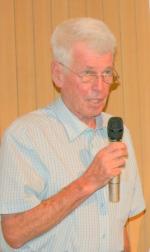 A talk given by Jim Wigan, Co-ordinator of the international Farmers’ Dialogue, it gives a farmer’s perspective on feeding a world accelerating towards nine billion people. Against a background of rising food and energy prices and serious shortages, he emphasised the part that every individual can play.
A talk given by Jim Wigan, Co-ordinator of the international Farmers’ Dialogue, it gives a farmer’s perspective on feeding a world accelerating towards nine billion people. Against a background of rising food and energy prices and serious shortages, he emphasised the part that every individual can play.
Will There be Food for All? Question posed by Farmers’ Dialogue coordinator at Greencoat Forum.
Declaring that the job of farmers was ‘to see that everyone in world is fed’, Jim Wigan, coordinator of an international Farmers’ Dialogue programme, spelt out a number of major ‘interlocking’ issues to achieve this goal, at a time of famine and food shortages. He was speaking at a Greencoat Forum in the London centre of Initiatives of Change, 7 October.
‘We are meeting in troubled times,’ he said. ‘About 35,000 people died of starvation and related illness in the last 24 hours: nearly one every two seconds.’ Scientists had predicted a year ago that ‘if we don’t act decisively within the next 18 months climate change would eventually push civilization over the edge.’ Now the financial markets were in crisis and more and more farmers were reporting that they were at the end of their tether.
Wigan, who taught on a farm mechanization scheme in Kenya for four years, listed key issues to be addressed if everyone was to live ‘in dignity in a stable society’. They included population growth, the free market system, energy resources, organic farming, genetically modified crops, seed patents, acute water shortages and ‘the motives and values that dominate our lives’. They touched everyone, whether growers or consumers of food.
On population growth: the world’s population is predicted to accelerate to over nine billion people by 2050, from today’s 6.5 billion. This required a trebling of world food production which, Wigan said, could potentially help the majority of the world’s poor, who are farmers, if price rises can reach themto lift them out of poverty. Studies had surprisingly shown an inverse relationship between the size of farms and their yield per hectare. Farms of less than one hectare in Turkey, for instance, are 20 times as productive as farms of over 10 hectares.
On climate change: global warming could lead to a reduction in agricultural output of up to 10 per cent by 2030, according to Chinese officials. India’s agricultural output could fall by 30 to 40 per cent by 2080. Cattle were responsible for 18 per cent of the world’s methane, a greenhouse gas. Yet trials taking place in Wales showed that adding chopped straw to silage in the diet of dairy cattle reduces methane by 20 per cent—and increases milk yields.

On free markets: These were not working for farmers, according to a Canadian National Farmers Union report. There, farmers had doubled exports, adopted high-value crops and new technologies, and invested billions of dollars in their farms. Yet free trade agreements had led to the worst farm incomes crisis since the 1930s. The world’s one billion farmers were now in a single, hyper-competitive market, following the removal of tariffs, quotas and duties. This had benefited big agribusiness mergers and ‘nearly eliminated competition’. The drive for free markets had ‘let the farmers down’, Wigan said. He called into question the ‘situation where countries provide subsidies that enable farmers to produce crops that are then exported at below the cost of production’. But he also acknowledged that such subsidies in Europe and the USA had secured food supplies in times of shortages. Before all subsides are removed it would be wise to plan for what took their place. This year, he said, the world would produce 676 million tons of wheat, against a global demand for 655 million tons. Total reserves would therefore grow by just 11 days. If surpluses reduced prices to consumers, this would take away incentives for producers to grow more.
On energy resources: Wigan pointed out that price rises were reducing the use of artificial fertilizers and chemicals. There was a need to ‘reduce miles from the field to the plate’, by growing and consuming locally. The world’s one billion poor small farmers, who use little or no oil, could play a growing part in building a sustainable, productive agriculture. High energy costs meant that wheat prices would not fall. In 2004, a ton of wheat cost £84 to produce, according to the Scottish government. Now UK farmers faced production costs of £123 per ton.
On organic foods: These would not provide enough food for today’s population let alone nine billion. However Wigan cited an experiment at the Rainbow Farm in Thailand where organic yields of rice were equal to conventional rice. Ducks that feed off snails—a pest in rice—are fed with an additive which creates algae in their manure. These fix nitrogen in the rice paddy fields, rather than having to be added through chemical fertilizers.
On GM crops: Wigan said that, while there was a potential for GM crops, especially to meet the developing world’s needs, the key issue was one of motive.Was it to maximize profits for agribusinesses such as Monsanto, ‘or to produce the food the world needs’? There was a need, for instance, to make crops resistant to the stem borer beetle which costs Zimbabwe $US 250 million a year in lost maize. Suicides amongst Indian farmers hit by the failure of their GM-modified cotton seeds had exposed ‘a lack of independent supervision of seed producers’, particularly Monsanto. The crop had not been adequately tested before being released for sale. It would be a mistake to write off GM as all bad, Wigan said. But ‘the greatest danger may well come from the behaviour of the producers rather than the technology itself.’ He particularly attacked the patenting of seeds by American agribusinesses following market deregulations, ‘making the farmer pay for growing the seeds his ancestors developed over thousands of years’. ‘If we get our motivation right it will be natural to resolve some of these questions,’ he added.
Wigan concluded by telling stories of grassroots initiatives. Juliana Swai, an agricultural extension officer in Muheza, Tanzania, looks after 35 dairy farmers’ groups, five of them run by women. Most had been destitute after their husbands had left them. But they were now self-supporting, sending their children to school and building houses. In India, ‘water harvesting’ could soon be practised in 20,000 villages. Check dams are built to slow water flows across rivers. This helps to replenish ground water supplies and makes village employment possible. This was helping to reverse migration to big cities in search of jobs. And in Cheshire, the village of Ashton Hayes was aiming to become the first community in England to be carbon neutral. In the first year they saved 20 per cent on their energy bills.

Such local initiatives, in which everyone had a part, were endorsed by the Scottish farmer, the Duke of Montrose. Speaking from the audience, he said that the British government had set radical targets to reduce the nation’s carbon footprint by up to 70 per cent.
Since its inception in 1993, Farmers Dialogue, a programme of Initiatives of Change, has involved some 750 farmers from 59 countries. It has held dialogues in Cambodia, France, India, Kenya, Poland, Switzerland, Uganda, the United States, Tanzania and Thailand.
Speaking at the Greencoat Forum, Farmers Dialogue activist Lewis Wallis, from Sussex, said:

After studying Agriculture at Wye College, London University, I have spent my entire life in agricultural development, in the Caribbean, Africa, the Pacific and Asia. I was introduced to the Farmers Dialogue in 1993, when 11 MPs from newly independent Ukraine visited London. I have visited Ukraine many times and have seen the changes in Ukrainian agriculture from a centralized collective system to free enterprise.
Earlier this year I spent three months at Asia Plateau, the Asian centre of Initiatives of Change. Its farm is now a centre for rural development and for transforming the local ecology. At Asia Plateau, Al Gore’s film An Inconvenient Truth convinced me that global warming is one of the greatest moral issues of our time. The world’s farmers will be affected—and our food supplies. The present economic and financial turmoil should help us to refocus on the values of honesty and unselfishness, purity and love, in our dealings with each other. The Chief Rabbi said on the radio that the age of greed is over. I hope he is right.
We all need to eat. We also need to ensure that our farmers get a fair return for their labour and that we care for this overcrowded planet’s natural resources. We have no alternative.



